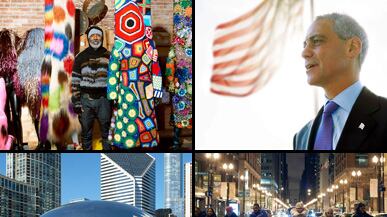As Chicago’s new mayor, Rahm Emanuel will return to a newly revitalized city, one with a thriving music scene, cutting-edge restaurants, lively arts, and a rapidly growing business and technology sector.
Gallery: Chicago’s Sights and Sounds

Mayor Richard Daley may have come under fire for cronyism and left the city careening toward bankruptcy, but he also helped give Chicago the finer touches it lacked, epitomized by the dazzling Millennium Park and so much new greenery Midwestern nurseries ran out of trees. Meanwhile, tourism, e-commerce, restaurants, arts, fashion, and culture have all taken on new life.
It’s partly Chicago’s current energy and élan that’s drawing the old Obama crew back. David Axelrod chose Chicago as his base for Obama’s 2012 reelection campaign for reasons both political—it will force him to be outside the Washington bubble—and personal. “It has all the advantages of a big city—great culture, theater, sports—with the sensibility of a small town,” says Axelrod. Meanwhile Desirée Rogers, fresh from her flameout as social secretary, is busy dragging Ebony into the digital world as CEO of Johnson Publishing.
Chicago has become fertile ground for business and technology. Chicago’s latest hero, Groupon founder Andrew Mason, came to Chicago from Pittsburgh, and it was Chicago’s population of young people that helped his company take root and grow, now to a point where it can turn down a $5.3 billion offer from Google.
The city is also entering a new era of cooperation across lines of class and race. Rahm Emanuel is the city’s first Jewish mayor, elected to office by black voters and other traditional blocs, and Ariel Investment is one of the largest black-owned investment firms in the country. It was from Ariel’s maple-paneled office overlooking the lake that Barack Obama started forming his new government and introduced himself to world leaders.
Ariel’s president, Mellody Hobson, thinks Chicago’s rapid growth in all sectors—economic, technological, cultural—is related. Why is Chicago the world’s leader in cutting-edge food? Why is the city once known as hog butcher to the world now offering a bacon martini at Moto? The cause, speculates Hobson, is a matter of the “begats.” One begats another that begats another.
Maybe the best illustration of the new Chicago, when it comes to food, anyway, is the opening of Next, chef Grant Achatz’s new project. Achatz revamped his restaurant Alinea with a far-out, multi-course menu and futuristic liquid-nitrogen dishes. For Next, he plans to build the menu around a historical or geographical conceit—a deconstruction of the classic Escoffier cookbook the Guide Culinaire or a visit to Peru.
Chicago has always been known for its music, but the homegrown Kanye West might no longer be the best person to look to for a glimpse of the city’s music scene—though he stays involved in the city with his RSVP Gallery, a museum/store in Wicker Park. A new crop of artists gives a more authentic taste of Chicago’s contemporary music scene: Boss Lady, DJ Gant-Man, King Charles, DJ Spinn, and other artists from the Bang Tha Box Recordingz roster work in Chicago juke, music accelerated to a frenetic 150-160 beats per minute and cycling through electronic samples of everything from hip-hop to swing.
Juke is now popular worldwide, selling out clubs in Europe, but it started in Chicago—no thanks to Mayor Daley, who refused to sponsor youth Juke events for fear that large gatherings of youth would lead to crime. Maybe Rahm Emanuel will see things differently. He should, if he doesn’t want to let the city’s new fizz fizzle.






